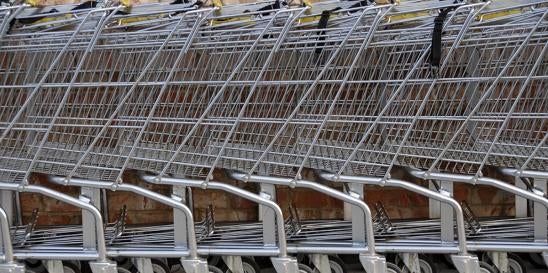Transcript
Alitia Faccone:
Welcome to We get work™ and The Year Ahead 2024 podcast series. Covering workplace issues from both subject matter and industry perspectives, the 19 episodes in our series provide both big picture trends and detailed tactics that can help employers achieve their workplace ideal, while remaining real about regulations, compliance challenges, and more in 2024. Jackson Lewis invites you and others at your organization to experience the report's legislative, regulatory, and litigation insights in full at our website, JacksonLewis.com, or listen to the podcast series on whichever platform you turn to for compelling content.
Laura Pierson-Scheinberg:
Hi, I'm Laura Pierson-Scheinberg out of the San Francisco and Baltimore offices. I'm the head of the retail industry group, and I have with me today two of our retail core team members to discuss some trends in the retail industry that we're seeing in the year ahead. Melanie.
Melanie Paul:
Thanks, Laura. I'm Melanie Paul. I am a principal in the Atlanta office of Jackson Lewis, and I'm also co-leader of the Workplace Safety and Health practice group. And I'm here today to talk about the hot button issues with OSHA, the Occupational Safety and Health Administration, related to the retail industry that this industry really needs to be aware of.
Shannon Nakabayashi:
Happy New Year, everyone. I'm Shannon Nakabayashi. I'm a principal in the San Francisco office and a wage and hour specialist, and today, I'm going to be talking about the changes to the minimum wage and how that impacts retailers.
Laura Pierson-Scheinberg:
Well, thanks so much ladies for joining me. You all are fabulous and I appreciate you being constant resources to me on our retail team. We could talk all day on all these topics, so we just want to hit real high level the trends we're seeing for our retailers out there. Since labor is near and dear to my heart, I'll start there. It still continues to be the labor renaissance. Labor is continuing to grow, and we recorded a podcast in this series, myself and Ed Jeffery, to discuss the shorter timelines that are effective as of December 26th for getting elections, union elections, some serious rule changes that are in effect that really impact, so we urge you to listen in there.
One of the things that we really need to focus on is training, making sure that you're paying people correctly, that employees are happy, focusing on organizational wellness because the renaissance is hot and you really need to be ready because the timelines are so, so short. The new guidelines say that you need to have an election as soon as practicable. It used to be no later than 20 days and the average was around 35 days. The timeline is fed up and you really need to be ready, so please consider your labor strategy in the retail space. We're seeing a huge spike of that activity in the retail space. Now, I'm just going to kick it over to Melanie to talk about what she's seeing in the trends for retailers in her area.
Melanie Paul:
Yes. OSHA has been very active and very aggressive on the enforcement side in this current administration, as some of you out there may have experienced, and part of that aggressive enforcement has been for OSHA to put out certain emphasis programs. There's a national emphasis program that targets retailers that have warehouses and distribution centers. That emphasis program came out in July of 2023, and it's going to be around for three years, and it could be renewed after that point as well. But basically, OSHA takes these emphasis programs and creates target lists from them. They're supposed to be neutrally created with software program that will spit out a list of employers in particular industry codes that are in that emphasis program. So, for retailers, this warehouse and distribution center emphasis program is going to target certain hazards that are common to those employers in those industries. Some of those hazards include struck-by hazards from powered industrial trucks, ergonomic hazards, heat hazards. Those are going to be the hot issues that OSHA is going to be looking at if OSHA shows up at your facility and is conducting an inspection under that emphasis program.
So, employers need to be aware of that emphasis program and to be on top of safety in those locations and all of their locations really, but making sure that they have addressed those hazards appropriately and that they are prepared in case OSHA shows up because OSHA won't give any warning before they show up. Your establishment could be on the target list and OSHA just goes down the list throughout the year or however long it takes to complete what they call a cycle, and they have to go through all of the employers that are on a list before they can generate a new one.
There are certain ways that you could be exempted from that list if you end up on it in the first place, but more than likely, if you're on the list, OSHA will show up one day unannounced, unexpected. They will do an inspection. It's supposed to be a partial scope inspection just based on the hazards identified in this emphasis program, but in reality, it sort of looks more like a comprehensive inspection. So, obviously, there's concern when OSHA is poking around at your entire facility and looking at these really large complex issues like ergonomics from repetitive motion, like heat.
Of course, there's also the Heat Illness Emphasis program on a national level from OSHA that is going to intercede with the warehouse emphasis program because there's a lot of retailers that have warehouses and distribution centers that could potentially end up on both lists. And certainly, if you're on one list and OSHA shows up to do a warehouse and distribution emphasis program inspection, they could also simultaneously open up a heat illness inspection. So, you definitely want to make sure that your programs are rock solid, that you've got your mitigation strategies in place, and if not, certainly talk to an experienced OSHA council who can help you with those things.
The second really hot issue that I've been seeing a huge uptick of at the end of 2023 that I believe will absolutely continue into this year is when you do get an inspection for any reason, OSHA seems to be asking for employers' emergency action plans. Now, it's certainly a best practice to have them. It's not a requirement that every employer across every industry have them, and the OSHA standard for emergency action plans requires them if another standard requires that you have it. Emergency action plans are the evacuation plans and what you're going to do in case of emergency inclement weather or major catastrophes, things like that, or in case of fire.
So, if you're a retailer that works with hazardous chemicals, if you have flammable chemicals in your work environment, then you might be required to have an emergency action plan under OSHA standards. But OSHA is really now seemingly expecting every employer to have them regardless of whether they're actually required to have them because they've been asking every employer I've seen in inspections for them, which I find interesting. And I have my suspicions that it's going to dovetail with OSHA's emphasis on workplace violence, vis-a-vis active shooters. So, I think as we see more of those unfortunate and terrible incidents throughout the country that happen in work establishments, I think OSHA's expectation is that you have an active shooter plan part of an emergency action plan. That's kind of the trend that I've been seeing and I think is going to continue into 2024, so definitely make sure that you've got all the things that you need in place, so that in case OSHA shows up, you can show that you're in compliance.
Laura Pierson-Scheinberg:
Thank you so much, Melanie, for that really robust overview. I know that in and of itself you could take up the entire time. You and I could talk about this all day, so maybe in the coming year you and I will do some podcasts to update the team. Now, Shannon, I don't want to leave you out of the party here. Let's talk about the wage and hour trends you're seeing from retailers. I think there's been some interesting things that are really worth highlighting.
Shannon Nakabayashi:
Sure. Absolutely. What I wanted to focus on today is the minimum wage because I think that's going to have the most immediate impact on retailers. The federal minimum wage of course is still $7 and 25 cents. And I think as a lot of people know, the Department of Labor has proposed increasing that, but whether or not those increases will actually be implemented nationwide is still up for debate. The Department of Labor has been trying to do this under the Biden administration for quite some time now, but we have states like California where the minimum wage is now $16 an hour, and not only does that impact the amount that employers have to pay their non-exempt employees, but it has further implications throughout the entire workforce that I think people need to consider. And the biggest thing is how that increase in the base minimum wage increases the salary basis for their exempt employees.
Obviously, for our retail clients, the biggest cost that they have is labor, so when you have an increase in the minimum wage, it's not just the cost that they have to pay, the sales clerks, and the people out on the sales floor, the hourly workers who are generally working three, four hours a day, but the biggest increase and the biggest impact tends to be on those managers who employers rely on, to do the bulk of the hours and to actually be there managing and holding down the store. Because what happens is that when the minimum wage is increased, the salary basis is increased.
The salary basis, just very briefly, is the minimum amount that an employee has to be paid in order to be exempt. So, you can have a manager who does nothing but exempt tasks all day long, but if they're not paid that minimum amount, they're never going to be exempt. So, in California, starting January 1st, all of your exempt store managers have to be paid $66,560 a year. It doesn't matter if they're full-time, part-time. That's the base number, and that number which has gone up every year for the past several years is just becoming a cost that is way too much for retailers to bear. You really cannot afford $60,000 plus for one person. Particularly for smaller retailers who have multiple stores, it's a lot to absorb.
Laura Pierson-Scheinberg:
So, how do you see retailers absorbing these increased labor costs?
Shannon Nakabayashi:
I think that they're doing it the same way that they have been doing it for the past decade, which is by lowering store hours and cutting staff down to the bare minimum. And this of course has a lot of risk because the fewer people that you have on site, the fewer people that you have to relieve others for breaks, and this leads to all kinds of other issues which are sort of beyond the wage and hour scope, but it just generally leads to putting themselves in a sort of more precarious position. And the employers that it hurts the most are the employers who have two or three stores where the owners themselves can't be on site. They need to rely on managers elsewhere. And if those managers can't be exempt, they just don't have the budget to pay them to be there like they need them to be there.
Laura Pierson-Scheinberg:
I'm seeing a trend where you just have all of the people in the store essentially be hourly paid because of these sort of landmines. What are you seeing the impact and response of the former exempt managers and how to navigate that? Because I'm really curious, as you've seen that over the years where clients have made those decisions. Any recommendations in that regard as our retail industry folks think about how to navigate this?
Shannon Nakabayashi:
Yeah. What I've noticed is that many years ago, a decade ago, there was a lot of resistance to people being reclassified. And I find that people in prior generations, they really identified with their role as a manager and with that title, and were personally very offended at the idea that, "Oh, no, I'm going to be a non-exempt person." And it took a lot of explaining and a lot of walking them through that it has nothing to do with you as an employee, and in fact, it's more beneficial to you as an employee to be eligible for overtime. We don't see that as much in recent years. I think that a lot of the Gen Z employees don't have that attachment to the managerial title, and I think that they're a lot more comfortable with being an hourly employee. So, we don't get a lot of pushback in that transition, and I think it has become a lot easier in the past, say, five years for employers to make that transition.
Laura Pierson-Scheinberg:
Well, that's a lot to think about. I mean, I think as we wrap this, we can too talk about this topic for some time. I hope we can talk about it in the coming year and do a session just on this as these factors sort of roll out some, as the minimum wage continues to rise and how the retailers are reacting.
Shannon Nakabayashi:
Another thing I do want to make sure that I mention, because the retail umbrella is broad and it includes our restaurant industry clients, is that the state of California has taken a special interest in fast food restaurants. So, for them, the minimum wage has gone up to $20 an hour, and the state has created its own fast food council. So, there's a whole host of issues which Laura, as you and I have discussed offline, we could have a whole other podcast just about that. I mean, it's very complex, but that's just something I wanted to make sure that our restaurant clients were aware of.
Laura Pierson-Scheinberg:
It really does impact the retailers too, because it's the same labor pool. So, as the minimum wage in a fast food restaurant goes up to $20, the local retailers are going to have to compete with those minimum wages. So, in effect, it becomes sort of their new floor and it's going to be a challenge. I look forward to monitoring this with you and talking with you over the coming year.
Well, Melanie, thank you for your time. Shannon, thank you for your time. I always enjoy talking with you. Let's just do one more parting recommendation for each of us in our areas. For labor, I would just say my parting comment is, please have a strategy. This issue is not going away, and the retail industry continues to be targeted for organizing, and the laws have changed so much that the timelines are so short that you have to be thinking about it now. So, I just encourage you to be asking your internal teams as to what your labor strategy is, and if you don't have one, please reach out to council to help navigate that. Melanie, any parting thoughts in your area?
Melanie Paul:
Absolutely. Now, more than ever, it's really vital that employers in the retail industry do a site safety audit and have job hazard analyses to review the hazards in their workplaces and identify the appropriate mitigation for those hazards, have the right programs and policies in place and training of employees on these hazards and how to best mitigate them to ensure compliance and a safe work environment, and of course, that if OSHA ever shows up at your door that you are prepared. Of course, if you need any help drafting any of these policies or conducting a site safety analysis, please contact JL attorney on the Workplace Safety and Health team or with the attorney with whom you normally work.
Laura Pierson-Scheinberg:
Shannon, what are your foods of thought on the way out here for the retail group
Shannon Nakabayashi:
Audit managers' salaries and plan to do it on a yearly basis. It's a really easy way to make sure that you are keeping up with the exemption requirements and to make sure that you are helping to avoid a future lawsuit. If you have any questions at all about California or about nationwide wage and hour law, we are here to help.
Laura Pierson-Scheinberg:
Well, thank you both so much for your time and I look forward to talking again with you all soon, and looking forward to the year ahead.
Shannon Nakabayashi:
Thanks, Laura.
Melanie Paul:
Thanks.
Alitia Faccone:
Thank you for joining us for The Year Ahead 2024 special edition podcast series. Please tune into our next episode, where we will continue to tell you not only what's legal, but what is effective. All of our Jackson Lewis podcasts are available to stream and subscribe on Apple Podcasts, Google Podcasts, Libsyn, Pandora, SoundCloud, Spotify, Stitcher, and YouTube.






 i
i


